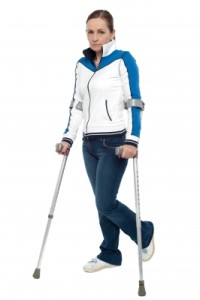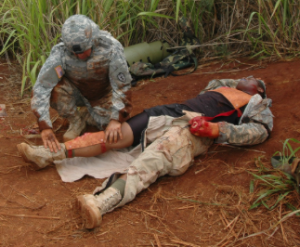How the Mind Shapes Your Pain

Do you have a hard time recovering from accidents?
Are you in chronic pain?
I used to be miserable and in pain with injuries. I remember twisting my ankle playing miniature golf, and I was out of my usual exercise routine and was depressed for weeks. 
Then a few years ago, I twisted my ankle in a step class and the first thing I did was used EFT (tapped). I didn’t care what people thought and I tapped as I was taken to the emergency room and in the doctor’s office. I tapped on the embarrassment of having fallen, I tapped on how difficult it was going to be to get around, I tapped on the anxiety about not knowing how bad the damage would be, I tapped on the pain and worry about not being able to exercise (which is an important stress reliever and anti-depressant for me), and I tapped about the potential loss of income (as a group exercise instructor).
By the time the doctor saw it, it was a Grade I sprain. I went home that day on crutches, but with no pain, and no drugs. By the evening I could hobble around without crutches. Eight days later, I was teaching group exercise again, and 11 days later I was 100% back to normal!
Why did I have such drastic differences in my recovery? Because what goes on in our mind shapes our pain.
In the Episode, “Pinpointing the Placebo Effect” on the podcast Radiolab, they told about the experience of a young medic who saw how a person’s story shaped the experience of pain. The medic was practicing on the battlefield in World War II, and noticed that while they were running very low in aesthetics, when he’d ask the soldiers if they needed any pain relief, a surprising number of soldiers would say, “No, Doc, I’m good!” Yet at his practice in Boston, the demand for anesthesia due to bullet wounds or physical injury was much higher and more common! Why would that be? Were the soldiers just more resilient?
In Boston at the time, the person shot was more likely to be leading a good and productive life. Maybe they owned a store, and were shot by a robber. The unexpected injury likely caused a tremendous disruption of their lives. The injury could have impeded their mobility and their way to make a living. It could have made them more dependent on others, and taken away their ability to support their family. With the shot of a single bullet, life went from good to very bad.
 On the other hand, a soldier is in a war zone. They are away from their loved ones and their lives are constantly in danger. And then they get shot at. All of the sudden, they have a way out. Getting injured means they get to go to the hospital, they get rest, a decent bed, and to meet pretty nurses. If they get discharged, they get to go home with a purple heart and are applauded for their bravery and service and treated like a hero. The shot of a single bullet could be their ticket out of hell and back home.
On the other hand, a soldier is in a war zone. They are away from their loved ones and their lives are constantly in danger. And then they get shot at. All of the sudden, they have a way out. Getting injured means they get to go to the hospital, they get rest, a decent bed, and to meet pretty nurses. If they get discharged, they get to go home with a purple heart and are applauded for their bravery and service and treated like a hero. The shot of a single bullet could be their ticket out of hell and back home.
There is now research to support this idea. Several studies showed that people with depression have higher levels of pain, greater risk of disability, and need longer sick leaves that people who do not have depression. A study from the journal Pain actually induced a depressed mood or a positive mood in patients with chronic back pain, and then asked them to rate their pain. They found that inducing a depressed state elevated their pain scores, while elevating their mood reduced their pain scores!
Why does mood or the story impact the perception of pain?
Apparently both emotional and physical pain activate the same 2 regions in the brain, the anterior insula and the anterior cingulate cortex. Thus pain relievers have been shown to reduce hurt feelings, and anti-depressants have helped mitigate pain. People who had recently experienced social rejection were divided into 2 groups. Subjects who *received acetaminophen had less activation in both of these brain regions. *Antidepressants also help relieve pain disorder, which is a form of chronic pain thought to be caused by psychological stress.
During his practice as a chiropractor, Dr. Bradley Nelson realized that certain people were not recovering from spinal manipulation. Typically those people had a background of depression or emotional trauma. He also realized that many people have emotional releases during manipulations. He discovered the concept of trapped emotions, where emotions get trapped in parts of our bodies. Often relieving trapped emotions is the missing key to relieving unresolved pain.
Using the Emotion Code and Body Code, I’ve helped several clients release long term chronic pain or physical disabilities as the result of an accident. Many of these clients had received the best Western medicine had to offer. The key to relief and restoring full functionality was letting go of the story around the pain.
Do you know anyone experiencing chronic pain? Share this article with them. After all, sharing is caring!
If you would like to learn more about how I can help, listen to the interview Releasing Subconscious Barriers, the Key to Health and Happiness, and call me at 1 855 ENERJOY for a complimentary 1 hr consultation.
* All pharmaceuticals come with side effects. I strongly recommend addressing root causes, so that you won’t need to be dependent on a pill. When you address root causes, you benefit from positive side effects if the root cause addressed was causing other problems!
Woman with Neck Pain courtesy of Marcolm at FreeDigitalPhotos.net
Pensive Looking Woman Using Crutches to Walk courtesy of FreeDigital Photos.net
Cropped photo of Injured soldier courtesy of The U.S. Army Hawaii at flickr.com



